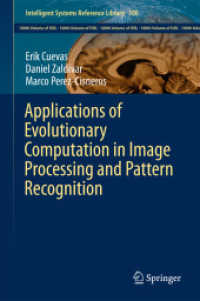- ホーム
- > 洋書
- > ドイツ書
- > Humanities, Arts & Music
- > Philosophy
- > general surveys & lexicons
Full Description
In God and Human Freedom: A Kierkegaardian Perspective Tony Kim discusses Søren Kierkegaard's concept of historical unity between the divine and human without disparaging their absolute distinction. Kim's central analysis between the relation of God and human freedom in Kierkegaard presents God's absoluteness as superseding human freedom, intervening at every point of His relation with the world and informing humanity of their existentially passive being. Kim argues Kierkegaard is not a strict voluntarist but deeply acknowledges God's absoluteness and initiative over and against human life. Moreover, the author's exploration of unity in Kierkegaard points to the very ethics of who God is, one who loves the world. Ultimately, God manifests that love in Jesus Christ, representing God's ultimate reconciliation with the world in his humility.
Contents
Contents: The God-Freedom Relation - Kant's Critique of Reason as a Prologemena to Kant's Influence on Kierkegaard and Kierkegaard's Critique of Kant - Heidegger's Concept of Freedom and the Kierkegaardian Critique - Sartre's Appropriation of Kierkegaard - Hegel and Kierkegaard on Freedom - Kierkegaard on Freedom and Grace - The Incarnation and the God-Freedom Relation - Is God Free? Barth and Moltmann on Divine Freedom.








